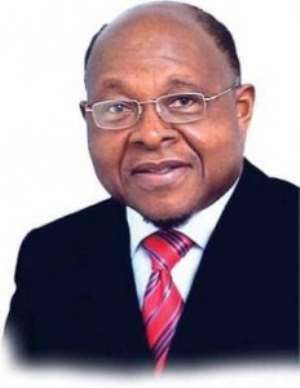
Former Deputy Speaker of Parliament, Prof. Mike Ocquaye, has suggested that instead of president appointing people to the council of state, there should rather be a powerful institutional representation to form the council of state.
According to him, over the years the council of state has failed to correct the president whenever he (the president) goes wrong because he appointed them.
He said “no president must have any hands in appointing members of the council of state to advise him objectively on national issues”.
The former Member of Parliament for Dome Kwabenya made the call at the second National Dialogue Series in Accra organized by the National Commission for Civic Education (NCCE).
Using our traditional system as a case study, Prof. MikeOquaye said, “In Ghana there is no tribe or culture of which the chief chooses members of his council…In fact, they themselves are sub-chiefs or heads of lineages who come to the council with independent authority and for that matter they become a counter-veiling power”.
He blamed the current situation on the constitutional arrangement that gives presidents to make such appointments
He, therefore, recommended an immediate review to the original concept and a stop to the current practice that allows the president to constitute the Council as enshrined established by Articles 89 to 92 of the 1992 Constitution.
But Dr. Dominic Ayeni, Deputy Attorney General and Minister of Justice, who was a co panelist at the dialogue session, do not share the opinion of the former MP that suggests that the president has absolute power over the council of state.
He said that, “the council of state, constitutionally is supposed to be an advisory body to the president and the president has limited powers over them”.
A former Justice of the Supreme Court, Mr. Justice VCRAC Crabbe who was also a panelist was of the view that the president or the executive arm of government has no absolute powers over any of the other arms of government.
He said the powers of the state resides in the people and that it is the responsibility of the people to elect right and competent people to represent them in parliament to put government on its toes.
The Council of State in Ghana is a small body of prominent citizens, analogous to the Council of Elders in the traditional political system.
It includes a former Chief Justice of Ghana, a former Chief of the Defense Staff and a former Inspector General of Police and the President of the National House of Chiefs. Each region of Ghana also has an elected representative.
The President of Ghana also elects eleven members. Members stay in office until the term of office of the president ends.
The National Dialogue Series, organized by the National Commission for Civic Education (NCCE) brought together members of parliament, politicians, NGO's, civil society groups to deliberate on the practicability of the concept of Separation of Powers.





 Ejisu by-election: Aduomi warns NPP against voter intimidation
Ejisu by-election: Aduomi warns NPP against voter intimidation
 High Court orders implicated four NDA officials to present defence
High Court orders implicated four NDA officials to present defence
 Let’s all be matured, patriotic to have a peaceful election this year – Dampare ...
Let’s all be matured, patriotic to have a peaceful election this year – Dampare ...
 Mahama's administration saw thievery that knew no bounds; stole from market wome...
Mahama's administration saw thievery that knew no bounds; stole from market wome...
 GRA/SML deal: Always read the stories behind the headlines or you'd look stupid ...
GRA/SML deal: Always read the stories behind the headlines or you'd look stupid ...
 GRA/SML Contract: It takes some 'wild' boldness for a president to make this dec...
GRA/SML Contract: It takes some 'wild' boldness for a president to make this dec...
 Elisu By-election: "If you call yourself a man, boo Chairman Wontumi again" — Bo...
Elisu By-election: "If you call yourself a man, boo Chairman Wontumi again" — Bo...
 Fuel tanker driver escapes with his life after tanker goes up in flames near Suh...
Fuel tanker driver escapes with his life after tanker goes up in flames near Suh...
 Uniform change: ‘Blue and white are brighter colours’ — Kwasi Kwarteng explains ...
Uniform change: ‘Blue and white are brighter colours’ — Kwasi Kwarteng explains ...
 MoE not changing all public basic school uniforms but only newly built ones — Kw...
MoE not changing all public basic school uniforms but only newly built ones — Kw...
